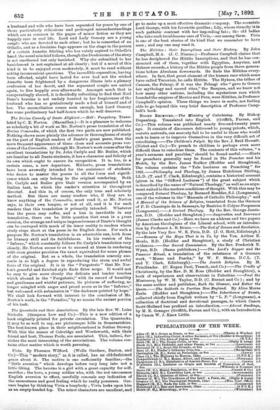The Divine Comedy of Dante Alighieri : — Hel1 : Purgatory. Trans-
lated by C. E. Norton. (Macmillan.)—It is a pleasure to welcome
so scholarly a bit of work as Mr. Norton's prose translation of the
Divine Commedia, of which the first two parts are now published. Nothing shows more plainly the advance in thoroughness of study on the part of English readers of Dante's great poem, than the more frequent appearance of these close and accurate prose ver- sions of the Commedia. Although Mr. Norton's work comes after the excellent translations by Dr. John Carlyle and Mr. Butler, which are familiar to all Dante students, it has a character and felicity of its own which ought to ensure its recognition. It is, too, in a certain sense, a new departure. Hitherto, prose translations have been avowedly intended for the assistance of students who desire to master the poems in all the force and signifi- cance which can only belong to the original rendering. Both Dr. Carlyle and Butler give their version accompanied by an Italian text, to which the reader's attention is throughout directed. And this is, of course, the only true and scholarly method. But there are many readers who, if they are to know anything of the Commedia, must read it, as Mr. Norton says, in their own tongue, or not at all, and it is for such readers that this translation is primarily intended. Whatever loss the poem may suffer, and a loss is inevitable in any translation, there can be little question that even in a prose -version, the strange and unique impressiveness of Dante's thought can be conveyed with much of its inner reality to readers whose study stops short at the poem in its English dress. For such a purpose Mr. Norton's translation is an admirable one, both from its literary skill and its faithfulness. In his version of the "Inferno," which constantly follows Dr. Carlyle's translation very closely, Mr. Norton seems to us to succeed at times in rendering with even greater precision the exact equivalent for some phrase of the original. But as a whole, the translation scarcely suc- ceeds in so high a degree in reproducing the stern and awful force of the original. It is in the " Purgatorio " that Mr. Nor- ton's graceful and finished style finds fitter scope. It would not be easy to give more closely the delicate and tender touches which abound in the "Purgatorio," with its record of humility and gentleness and wistful patience, its pictures of suffering, no longer mingled with anger and proud scorn as in the "Inferno," but welcomed with submission in "the darkness quieted by hope." We shall look forward with interest to the conclusion of Mr. Norton's work, in the "Paradiso," by no means the easiest portion of his task.






































 Previous page
Previous page